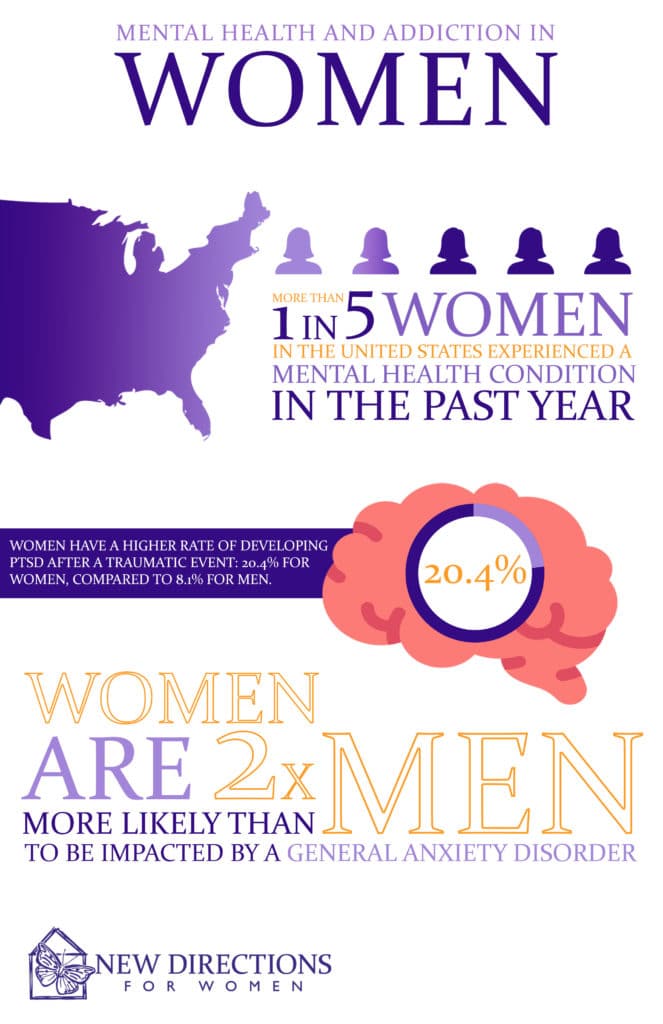Being in good mental health is essential to a woman’s overall well-being. Yet, more than 1 in 5 women in the U.S. struggle with a mental illness. But, World Mental Health Day helps bring awareness to mental illness struggles and how it leads to addiction in women.
Mental Illness is More Common in Women than Men
As we celebrate World Mental Health Day, let’s focus on an  essential topic of a woman’s health; their mental health. Many times when we speak about mental health, we don’t break it down to gender. However, there are many aspects of mental health that are specific to women. Research shows that mental illness affects women differently than men in the following ways.
essential topic of a woman’s health; their mental health. Many times when we speak about mental health, we don’t break it down to gender. However, there are many aspects of mental health that are specific to women. Research shows that mental illness affects women differently than men in the following ways.
- More than 1 in 5 women in the United States experienced a mental health condition, such as depression or anxiety, in the past year.
- More women with Serious Mental Illness (71.5%) received mental health treatment than men with SMI (57.7%).
- The prevalence of AMI (Any Mental Illness) was higher among women (22.3%) than men (15.1%).
- Women are twice as likely as men to be affected by unipolar depression. This depression is forecast to be the second most common source of “global disability burden” by 2020.
- Women are two times more likely as men to be impacted by Generalized Anxiety Disorder (GAD).
- Women have a higher risk of developing PTSD after a traumatic event: 20.4% for women, compared to 8.1% for men. According to the ADAA, 65% of male rape victims and 45.9% of women who are victims of rape develop PTSD as a result.
- Women are almost 10 times more likely than men to be affected by an eating disorder.
- The U.S. Armed Forces Health Surveillance Branch found that women service members were diagnosed with anxiety at a rate that was 1.4 times that of their male counterparts. Women in the survey were 1.9 times more likely than men to be diagnosed with depression.
- The NIMH figures compiled indicate that severe mental illness (SMI) affects more than 11 million adults in the U.S. each year, which is 4.5% of the adult population. Yet SMI was diagnosed in 5.7% of adult women and 3.3% of men.
Mental disorders can affect women very differently than men. Likewise, some disorders, such as depression and anxiety, are more common in women. However, some mental disorders are unique to women. For example, some disorders appear during hormone changes. These disorders include perinatal depression, premenstrual dysphoric disorder, and perimenopause-related depression.
The Importance of World Mental Health Day for Women
World Mental Health Day is October 10. For the first time, the World Health Organization (WHO) will host a global online mental health event. During the event, WHO will show the work they are doing for both women and men around the globe. Their work includes reducing mental health and the harmful use of drugs and alcohol.
WHO is committed to nondiscrimination and leaving no one behind. It also focuses on giving each person access to treatment regardless of gender. Unfortunately, women across the world face inequality that puts their physical and mental well being at risk.
World Mental Health Day helps shed light on the struggles of women and mental health. The hopes of this day are for governments to invest more in mental health prevention and treatment. The hope is also for employers to realize offering mental health coverage; it increases productivity and makes employees feel important.
Women across the world benefit from WHO because it focuses on:
- Improving women’s physical health
- Improving mental health treatment
- Ending the stigma and discrimination against women in all parts of life
- Improving family relationships
- Prevention and treatment of substance use disorder
- Ending violence against women
When Women Struggle with Anxiety

According to the Anxiety and Depression Association of America, women are twice as likely to suffer from anxiety than men. Although it hasn’t been well researched, the fact that culture doesn’t grant women full equality in education, income, and career may play a part.
Before we talk about how anxiety leads to substance use disorder, let’s talk about a woman’s unique anxiety. Anxiety takes advantage of a woman’s “fight or flight” response. The hormones and chemicals produced in this response make this response last longer. Above all, the increase in response time can increase the chance of developing an anxiety disorder.
Additionally, women go through various hormonal changes throughout life. For instance, puberty, pregnancy, and menopause cause major hormonal shifts that are linked to anxiety. Unfortunately, women will experience physical and sexual abuse more often than men. These traumatic events increase anxiety and make it harder for you to process emotions.
Mental Illness Symptoms are Different in Women
Mental illness symptoms can be different in two people with the same disorder. This difference is even more different between women and men. For example, anxiety symptoms may be more pronounced in women because society has given women “permission” to express their feelings. This is thought to be one reason mental illness can be debilitating in women. Although with depression, women tend to relive the issues while men typically distract themselves.
Eating Disorders are More Common in Women
Although men and women can both suffer from eating disorders, women are 10 times more likely to have an eating disorder. Almost two-thirds of people with anorexia, bulimia, or other eating disorders are women. However, transwomen have higher rates of eating disorders due to additional body dysphoria or dysmorphia issues.
Women Struggle with PTSD at Higher Rates
The National Association of Mental Illness says women are twice as likely to have PTSD than men. And although anyone can suffer from PTSD, around 10% of women have PTSD compared to 4% of men. There are several reasons for this difference including:
- They type of trauma
- Culture and gender roles
- Coping strategies
Women Have Reproductive-Related Mental Issues
Women who were assigned the female gender at birth may have mental issues because of childbirth. These mental illnesses include postpartum depression, premenstrual dysphoric disorder, and issues relating to menopause. If you are a woman suffering from a mental illness like postpartum depression, you are not alone. Many women feel the same way, and you must reach out for help.
Stigmas Affect How Women Get Help
Back in the day, many mental illnesses in women were diagnosed as “hysteria.” Hysteria is a Greek word meaning “wandering uterus.” Unfortunately, women were overlooked by professionals and labeled “crazy” for many years. However, the same symptoms and behaviors in men were seen as “normal.”
Additionally, women are often diagnosed with borderline personality disorder. Even worse, often, women have their symptoms dismissed by doctors. Furthermore, women are less likely to be diagnosed with “masculine” disorders such as substance use disorder, antisocial personality disorder, and attention-deficit hyperactivity disorder (ADHD).
The Link Between Mental Illness and Addiction in Women
When women suffer from a mental illness, it can feel overwhelming. Whether it’s the intense daily panic of anxiety or the severe sadness of depression, many women turn to drugs and alcohol to cope. However, this leads to more intense symptoms and substance use disorder.
At first, using drugs or alcohol to cope with symptoms of mental illness helps. But, continuing to do so leads to needing more of the substance. A woman’s brain and body builds tolerance and becomes dependent quickly after regular use begins. But, this traps women in a cycle of substance misuse when they are only trying to cope with mental illness.
Facts About Women and Substance Use Disorder
Traditionally, most people thought individuals with substance use disorder were men. But, research has shown that women are just as likely to suffer from substance use disorder. Some of the research has shown:
- Women suffer substance use disorder after using smaller doses and in a shorter time than men.
- Hormones can make women more sensitive to certain drugs.
- Women who use drugs and alcohol have different changes in their brains than men.
- A woman’s menstrual cycle can affect her withdrawal symptoms and their chance of recurrence of use during recovery.
- Women are more likely to experience worse anxiety and depression from certain substances than men.
- Women sometimes have more physical symptoms from drug use than men do.

With the help of WHO, the mental health of women across the world is getting the attention it needs. WHO’s research has increased awareness of the difference in women’s mental health and is helping with treatment and recovery.
The Focus of WHO in Women’s Mental Health
The focus of WHO is to improve the mental health of all people across the globe. This focus includes the mental health of women. WHO’s work includes:
- The promotion of mental wellbeing
- The prevention of mental disorders
- The protection of human rights
- The care of people with mental disorders
Despite the progress in some countries, women still experience severe human rights violations, discrimination, and stigma. However, many mental illnesses can be treated at very low costs. But, effective treatment coverage is extremely low. As a result, in 2019, WHO launched the WHO Special Initiative for Mental Health (2019-2023).
Find Help at New Directions for Women
If you are one of the many women struggling with mental illness or substance use disorder, our caring team can help. We serve women from all backgrounds, ages, and situations. We offer a gender-specific setting to help all women feel comfortable and receive the support they need for recovery.
What are you waiting for? One call and you can join our other members who have found recovery. Contact us today and start your journey to mental wellness.
References:
https://adaa.org/about-adaa/press-room/facts-statistics
https://www.nimh.nih.gov/health/topics/women-and-mental-health/index.shtml
https://www.who.int/health-topics/gender#tab=tab_1
https://www.womenshealth.gov/mental-health
https://www.nami.org/Blogs/NAMI-Blog/October-2019/PTSD-is-More-Likely-in-Women-Than-Men












